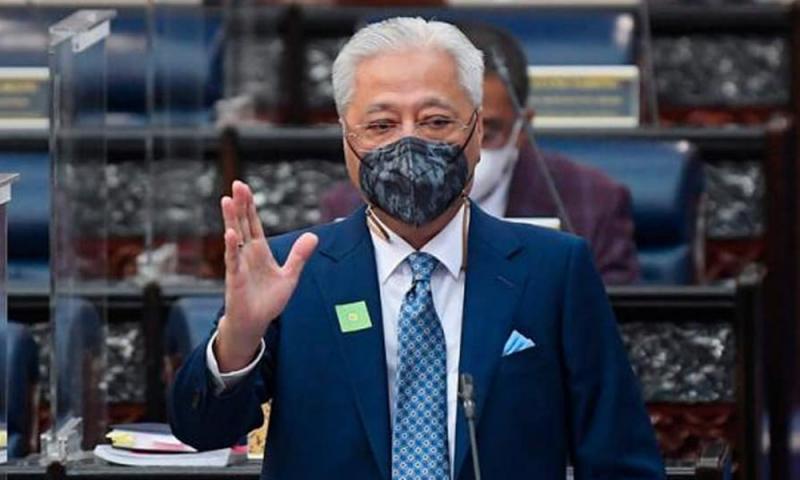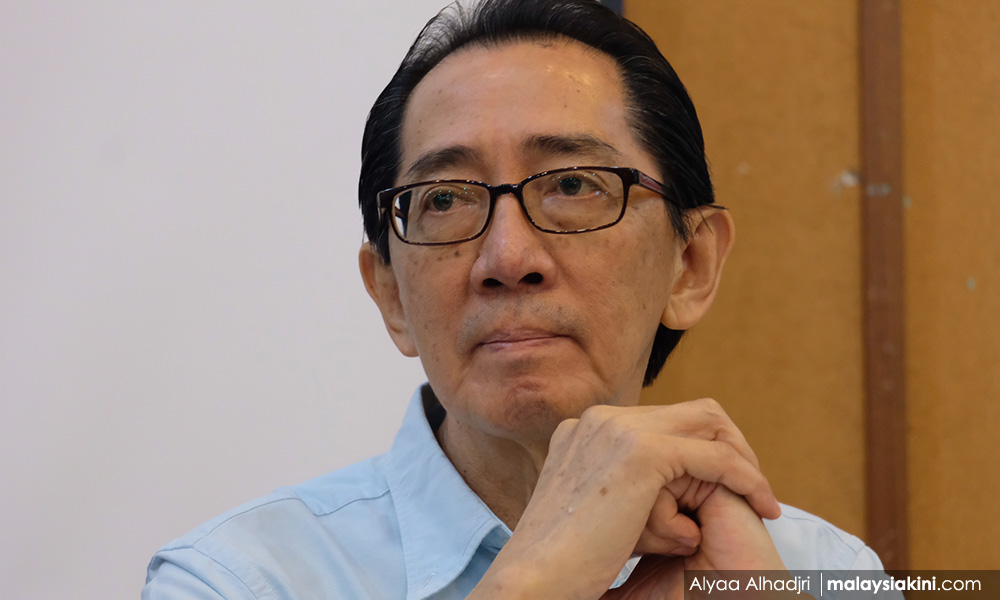
Bumiputera agenda a farce which will always be supported [kt notes: by the Lims' DAP coterie]
S Thayaparan
“You cannot swim for new horizons until you have courage to lose sight of the shore.”
COMMENT | Writing of the 12th Malaysia plan, P Ramasamy, one of the few truth speakers in Pakatan Harapan, asked: “Will there be pressure on the part of the Harapan opposition to ensure that the 12MP will not be a repeat of earlier plans?”
While I understand the need to ask this question, it is an unfair question to ask, because as we know, Harapan has always chased the same political high when it comes to the bumiputera question, not to mention the system of governance as BN/PN. To understand this, it is best to revisit Suaram adviser Kua Kia Soong’s piece here.
But really, I have no idea what the real situation of the bumiputera is. I doubt anyone does. I know for a fact that the Orang Asal of this country have a raw deal when it comes to participation and equity but really, their issues are the last thing that the mainstream political class and polity care about.
Nobody really knows beyond a scattering of data points quoted by supporters and detractors, because you cannot have an honest conversation about race in this country.
We know there have been Umno ministers who said that Malay “rights” to entitlement programmes should remain in perpetuity and we know that opposition political operatives have no real agenda to deal with this question beyond blathering on about needs-based affirmative action.
Indeed Prime Minister Ismail Sabri Yaakob has admitted that all those poverty alleviation programmes are carried out by the vast bureaucracy and nobody has any idea about their effectiveness – “… that hitherto many ministries had programmes on poverty alleviation but there was no specific monitoring on their effectiveness.”

Suaram adviser Kua Kia Soong
Not because monitoring these programmes would mean there would be transparency, but because many of these poverty alleviation programmes were part of the gravy train driven by bureaucrats, political operatives and their various proxies.
Hence all this talk of poverty alleviation especially when it comes to the Malay community is mired in the kind of corruption that plagues the mainstream political establishment.
This is not to say that people do not need help, but rather the way how the political establishment targets certain groups while allowing the political elites to get away with literal theft, is part of mainstream politics in this country.
Refer to Kua's piece about Harapan's tackling of the kleptocratic problem in this country.
Accustomed to government handouts
As PSM’s Dr Jeyakumar Devaraj said in 2019 when Harapan was mucking about with the aid given, to of all people fishermen: "If you stop affirmative action for the rich Malays, even the poor Malays would accept it."
And when Ismail Sabri said this – “Yet, another day, perhaps the religious council will bring zakat relief for the village again, and train the people again. But no one is monitoring. No one shows the way. (The visitors) give courses, give goods, and then leave... in the end everything is a failure. The project fails because there is no specific monitoring.” – we know that non-Malays are not subject to these types of poverty alleviation programmes.
Indeed if we could get one agency to help, that would be manna from heaven.
Beyond the fact that this demonstrates how ineffective these programmes are to the Malay community, it also demonstrates how people have become accustomed to government handouts from various programmes from different ministries, each enabling the current political structure to maintain power through entitlements.
Forget about non-Malay political operatives for a moment. This idea that non-Malays will always find a way to achieve their ambitions in this racist system is mainstream political propaganda.
They do not need the system; hence the system should reflect the needs of the majority.
This enables corrupt politicians to shape anti-inclusion narratives that receive very little pushback because, to do so, would jeopardise the political power of non-Malays, which over the decades has diminished anyway.
“You cannot swim for new horizons until you have courage to lose sight of the shore.”
- William Faulkner
COMMENT | Writing of the 12th Malaysia plan, P Ramasamy, one of the few truth speakers in Pakatan Harapan, asked: “Will there be pressure on the part of the Harapan opposition to ensure that the 12MP will not be a repeat of earlier plans?”
While I understand the need to ask this question, it is an unfair question to ask, because as we know, Harapan has always chased the same political high when it comes to the bumiputera question, not to mention the system of governance as BN/PN. To understand this, it is best to revisit Suaram adviser Kua Kia Soong’s piece here.
But really, I have no idea what the real situation of the bumiputera is. I doubt anyone does. I know for a fact that the Orang Asal of this country have a raw deal when it comes to participation and equity but really, their issues are the last thing that the mainstream political class and polity care about.
Nobody really knows beyond a scattering of data points quoted by supporters and detractors, because you cannot have an honest conversation about race in this country.
We know there have been Umno ministers who said that Malay “rights” to entitlement programmes should remain in perpetuity and we know that opposition political operatives have no real agenda to deal with this question beyond blathering on about needs-based affirmative action.
Indeed Prime Minister Ismail Sabri Yaakob has admitted that all those poverty alleviation programmes are carried out by the vast bureaucracy and nobody has any idea about their effectiveness – “… that hitherto many ministries had programmes on poverty alleviation but there was no specific monitoring on their effectiveness.”

Suaram adviser Kua Kia Soong
Not because monitoring these programmes would mean there would be transparency, but because many of these poverty alleviation programmes were part of the gravy train driven by bureaucrats, political operatives and their various proxies.
Hence all this talk of poverty alleviation especially when it comes to the Malay community is mired in the kind of corruption that plagues the mainstream political establishment.
This is not to say that people do not need help, but rather the way how the political establishment targets certain groups while allowing the political elites to get away with literal theft, is part of mainstream politics in this country.
Refer to Kua's piece about Harapan's tackling of the kleptocratic problem in this country.
Accustomed to government handouts
As PSM’s Dr Jeyakumar Devaraj said in 2019 when Harapan was mucking about with the aid given, to of all people fishermen: "If you stop affirmative action for the rich Malays, even the poor Malays would accept it."
And when Ismail Sabri said this – “Yet, another day, perhaps the religious council will bring zakat relief for the village again, and train the people again. But no one is monitoring. No one shows the way. (The visitors) give courses, give goods, and then leave... in the end everything is a failure. The project fails because there is no specific monitoring.” – we know that non-Malays are not subject to these types of poverty alleviation programmes.
Indeed if we could get one agency to help, that would be manna from heaven.
Beyond the fact that this demonstrates how ineffective these programmes are to the Malay community, it also demonstrates how people have become accustomed to government handouts from various programmes from different ministries, each enabling the current political structure to maintain power through entitlements.
Forget about non-Malay political operatives for a moment. This idea that non-Malays will always find a way to achieve their ambitions in this racist system is mainstream political propaganda.
They do not need the system; hence the system should reflect the needs of the majority.
This enables corrupt politicians to shape anti-inclusion narratives that receive very little pushback because, to do so, would jeopardise the political power of non-Malays, which over the decades has diminished anyway.

Former premier Dr Mahathir Mohamad
Furthermore, if non-Malays question “privileges”, “rights”, and whatever else the political establishment deems sacred, we are accused of causing disharmony or being seditious or whatever other relics of colonialism that find new use against age-old dissent.
Non-Malays not only have to abide by the odious “social contract”, but we also have to be complicit in it. Non-Malays who deviate from the groupthink, or non-Malay political operatives who attempt to argue otherwise, are vilified by their own, who tell them through various excuses and justifications which boils down to not spooking the Malays.
Only some extremely brave Malays – who understand that it could be worse for them – dare speak up, and most often they are ostracised by the mainstream of their community because the political elites wage a campaign of lies and propaganda against them and they will get no help from non-Malay political operatives.
This is why non-Malay Harapan political operatives were comfortable propping up their Malay partners and reinforcing certain mainstream ideologies over their coalition’s manifesto.
Furthermore, if non-Malays question “privileges”, “rights”, and whatever else the political establishment deems sacred, we are accused of causing disharmony or being seditious or whatever other relics of colonialism that find new use against age-old dissent.
Non-Malays not only have to abide by the odious “social contract”, but we also have to be complicit in it. Non-Malays who deviate from the groupthink, or non-Malay political operatives who attempt to argue otherwise, are vilified by their own, who tell them through various excuses and justifications which boils down to not spooking the Malays.
Only some extremely brave Malays – who understand that it could be worse for them – dare speak up, and most often they are ostracised by the mainstream of their community because the political elites wage a campaign of lies and propaganda against them and they will get no help from non-Malay political operatives.
This is why non-Malay Harapan political operatives were comfortable propping up their Malay partners and reinforcing certain mainstream ideologies over their coalition’s manifesto.

two Tai-Seow clearing the way for me and my Malay Dignity buddies
Now of course, especially for Harapan supporters, blaming former premier Dr Mahathir Mohamad for this mess ignores the reality that non-Malay political operatives from Harapan were supporting him.
And all of this is in service of a bunkum policy that has no basis in reality.
The reality is that non-Malays are always going to be used to justify the bumiputera agenda and the irony is that non-Malay political operatives are always going to support this agenda.
S THAYAPARAN is Commander (Rtd) of the Royal Malaysian Navy. Fīat jūstitia ruat cælum - "Let justice be done though the heavens fall."
And all of this is in service of a bunkum policy that has no basis in reality.
The reality is that non-Malays are always going to be used to justify the bumiputera agenda and the irony is that non-Malay political operatives are always going to support this agenda.
S THAYAPARAN is Commander (Rtd) of the Royal Malaysian Navy. Fīat jūstitia ruat cælum - "Let justice be done though the heavens fall."

MCA sapot bumi agenda for 50 years, since 1971 - no mention? In fact still sapoting now again, in 12MP.
ReplyDeletehttps://www.malaysiakini.com/news/423604
ReplyDeleteQUOTE
The ‘apa lagi Cina mahu’ politics of endless division
James Chin
Published: May 7, 2018
COMMENT | The political issues the Chinese community faces at the 14th general election hasn’t changed much for the past 40 years.
Since the introduction of the New Economic Policy (NEP) in 1971, what the Chinese Malaysian community wants can be easily summarised in a single sentence: the community wants political equality and equal treatment, and a free hand in the economy. And an Umno-led government will never grant these two wishes, now or ever.
By almost every political measure, the Chinese Malaysian community’s political interests are systematically pushed aside in the name of a 'Malay agenda', or to be blunt, in the name of the ketuanan Melayu (Malay supremacy) ideology.
It’s taken for granted that if a Chinese Malaysian company wants government business or to grow bigger, it needs one or two influential Malay partners, preferably one with a direct connection to Umno. The gold standard is to have Malay royalty as your business partner.
Politically marginalised by government policies, Chinese Malaysians sometimes call themselves “second class” citizens. From the annual distribution of university scholarships and placements to business opportunities, being a Bumiputera Malay means you have the first bite.
In the economic arena, big government projects are usually granted first to Malay-majority companies or joint-ventures between bumiputera and Chinese businesspeople. Many government projects and procurements require the bidder to be bumiputera-majority companies. In practice, non-bumiputera companies are simply not allowed to take part in the tenders.
This is the reason why the Chinese-based parties in the Umno-led BN, the most prominent being the MCA and Gerakan, do not substantially discuss public policies of national importance.
They accept initiating important public policies are the purview of Umno. The MCA and Gerakan’s roles are to react to the policies after they have been adopted by the government, and political success is measured by their ability to tone down or blunt the policies that often hurt Malaysian Chinese interests.
.....con't
...con't
ReplyDeleteBoth the MCA and Gerakan have defended their legitimacy over the past four decades through 'service politics' rather than advocating political equality.
The MCA and Gerakan systematically established service centres to help constituents with day-to-day problems rather than dealing with policy issues. Constituents can seek assistance in their dealings with government departments, or welfare assistance such as applications for the government’s BR1M cash handouts. This model has proven effective for the BN Chinese parties at a local level as municipal councillors are directly appointed by the BN government.
At the same time, the BN Chinese parties also engage in fear politics. They insist that without their presence in the federal cabinet and state governments, the implementation of ketuanan Melayu will be even more severe for the Chinese Malaysian community. By claiming to blunt or modify the sharper aspects of pro-bumiputera policies, these parties defend their relevance in the BN coalition.
This method, however, fell apart in 2013. At the 13th general election, then MCA president Dr Chua Soi Lek took a political risk by declaring to the Chinese Malaysian community that MCA would not join the Umno-led government if it failed to win the support of the community.
This desperate move backfired and the MCA suffered heavy losses at GE13, ending up with only seven parliamentary seats and 11 state seats. Chua kept his promise and the MCA declined all appointments to the federal cabinet.
Within a year however, Chua was defeated in a party election by Liow Tiong Lai, who stood on a platform of “returning to cabinet to represent” Chinese interests. To Umno’s credit, it stood by its oldest ally, probably knowing that the MCA’s losses were due to Umno’s aggressive Malay agenda. The MCA was duly given two cabinet posts in the federal government plus other positions after Liow’s party victory.
This was a watershed episode in Chinese Malaysian politics. The Chinese community learnt that life goes on without any MCA representatives in the cabinet. The MCA, or for that matter, any Chinese representation in the federal cabinet, did not alter their daily lives.
The Chinese Malaysian business class could not care less as they have been directly doing business with Umno proxies for decades. The stark truth is that the Chinese Malaysian community does not count politically at the highest level of BN government.
While the MCA 'in and out' saga was going on, the Chinese Malaysian community could see that Penang’s DAP-led state government, and DAP representatives in the PKR-led Selangor state government (elected in 2008), were doing a good job in ensuring that anti-Chinese policies at the state level were kept to a minimum.
While affirmative action policies were still being pursued, the Chinese community could see that more resources were being channelled into Chinese-owned small and medium-sized enterprises (SME), and the Chinese schools sector.
In other words, it was possible to pursue both Malay interests and Chinese interests in most areas. The general perception among Chinese Malaysians was of an Umno-led government pursuing Malay interests at the expense of Malaysian Chinese interests.
Blatant attacks and insults against the Chinese Malaysian community by Malay and Islamists right-wing groups in the past few years have only hardened the attitude against Umno. It does not help that senior Umno officials come out regularly with blatantly anti-Chinese statements.
...con't